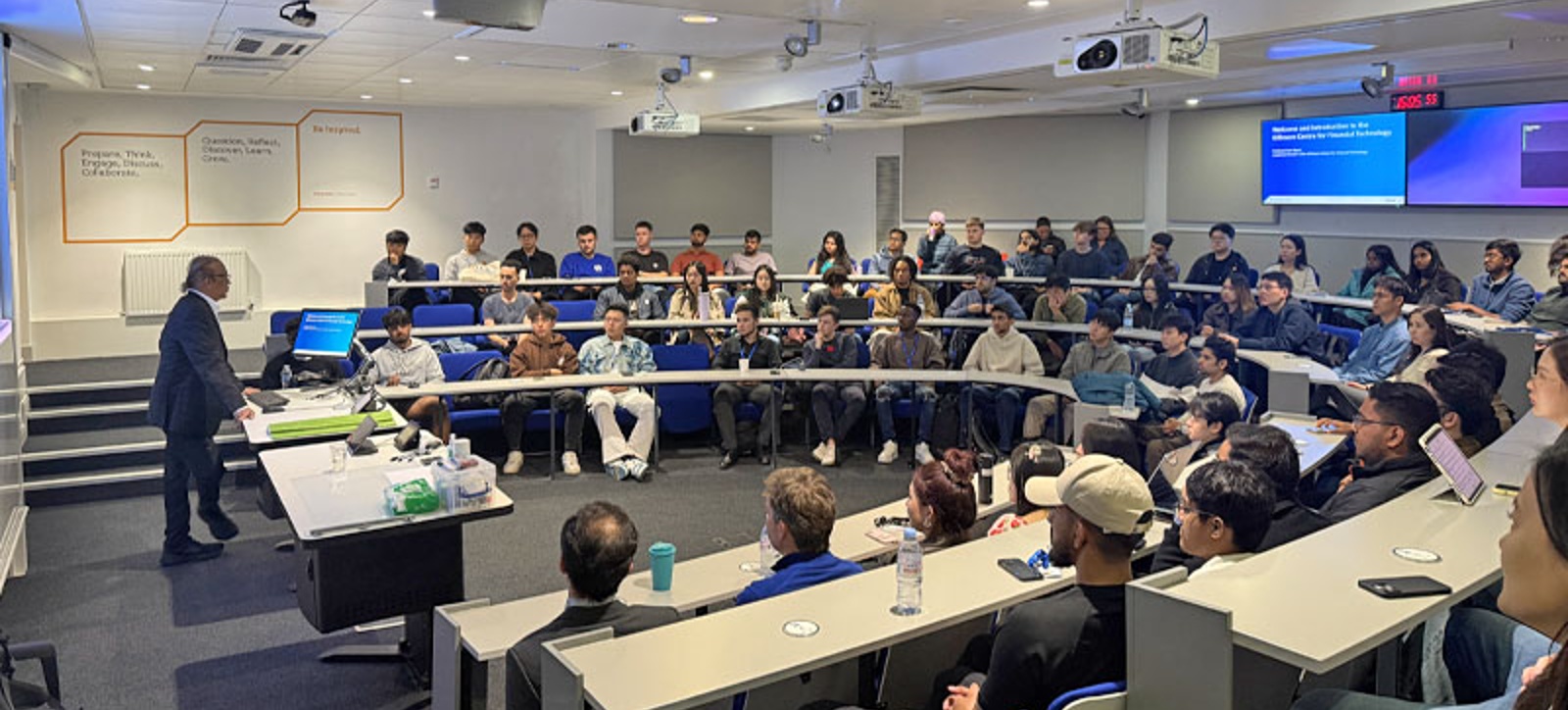
Gillmore gathering: Ram Gopal of the Gillmore Centre for Financial Technology addresses students
Warwick Business School’s new MSc Financial Technology course has welcomed its very first cohort.
Eighty students from all corners of the globe have joined up to gain the skills for a career at the intersection of artificial intelligence, emerging technologies and financial innovation.
“Our mission is to create the next generation of fintech talent,” Ram Gopal, Professor of Information Systems Management and Director of the School’s Gillmore Centre for Financial Technology, said in an introductory address to the students at the Centre's Fintech Innovation Lab.
The MSc Financial Technology programme has been built around the pioneering research of the Centre and will offer a deep dive into quantitative methods, data science, blockchain, artificial intelligence and financial systems.
It will also offer strong industry connections, with an advisory board of senior industry leaders on hand to offer help and encouragement to students. Two members of that board – Rebecca Shao, Innovation and FinTech Lead at Jaguar Land Rover (JLR), and Dan Philps, Head of Rothko Investment Strategies – addressed students at the induction event.
Moris Strub, Associate Professor of Information Systems and the inaugural Course Director, said: “We wanted this to be an industry-relevant course and for our students to succeed in their careers. That’s ultimately our goal, so the advisory board is there to make sure our course is relevant, and stays relevant.
“One of the points that makes our course quite unique is the Fintech in Practice capstone module.”
This module held at WBS London at The Shard will give students the chance to fine-tune the skills they have learned on the course to address practical industry challenges.
“Students will develop solutions on a project of practical relevance,” Dr Strub said.
“Moreover, with The Shard at the heart of London’s financial ecosystem, they will make connections with representatives from fintech firms and traditional financial institutions.
“The module finishes with students presenting their solutions to faculty members and industry representatives.”
There are also capstone alternatives to Fintech in Practice: either a company internship or applying knowledge learned on the course in an end-of-year dissertation.
The capstone offering follows a year when students will have explored the technological backbone of blockchain and distributed ledger technologies, delved into cybersecurity strategies within corporate ecosystems, and assessed the disruption of consumer financial services by digital innovation.
The curriculum also covers digital currencies and decentralised finance (DeFi), while technical fluency is developed through Python-based big data analytics and Generative AI applications with a focus on financial data management.
Fintech career paths
Optional modules will allow students to tailor their expertise. These include explorations of algorithmic and robo-advisory systems, data science applications in economics, and how AI influences moral decision-making in business. Participants can also learn about digital service innovation, entrepreneurship and business venturing, and financial analytics.
“There is a whole range of possible career pathways for our graduates because fintech is not a fringe activity anymore,” Dr Strub said.
“We have reached a point when the entire financial industry and beyond is doing fintech, not just start-ups.
“All companies are now putting fintech disruption at the heart of their strategy. Corporates like JLR see themselves as fintech partners. They are not just selling cars; they are offering platforms for car financing, insurance services and so on.”
Nor are those looking to launch a career at the cutting-edge of the new financial services landscape solely drawn from finance or business backgrounds.
Moun Benyettou and Dan Oprea – students in the first MSc Financial Technology cohort – have first degrees in English Literature and Psychology, respectively.
Both developed an interest in technology and financial markets a few years ago as the disruptive effectives of AI, machine learning and big data were first being felt.
Moun, 26, said: “As long as the disruption moves things forward positively, I think it is a good thing.
“If we tilt AI in the right direction, I think it will definitely create new jobs.”
Dan, 23, added: “I think the disruption of fintech will lead financial services in the right direction. Technology makes fewer errors than humans, so there will be better risk management in the long term.
“I think the data science dimension is particularly interesting. Data-based decision-making is absolutely driving the financial services industry now, and it’s very exciting.”
And why WBS to kick-start their fintech careers?
Both students were drawn by the strong academic reputation of WBS, but also thought its responsiveness was noteworthy.
“I was looking at multiple places but the WBS outreach team were the most available and accessible,” Moun said.
“They were there when we needed them. They ran regular webinars. They made me feel close to the student and academic community I would soon be joining.”
Discover more about Warwick Business School’s Master's Courses.




 X
X Facebook
Facebook LinkedIn
LinkedIn YouTube
YouTube Instagram
Instagram Tiktok
Tiktok